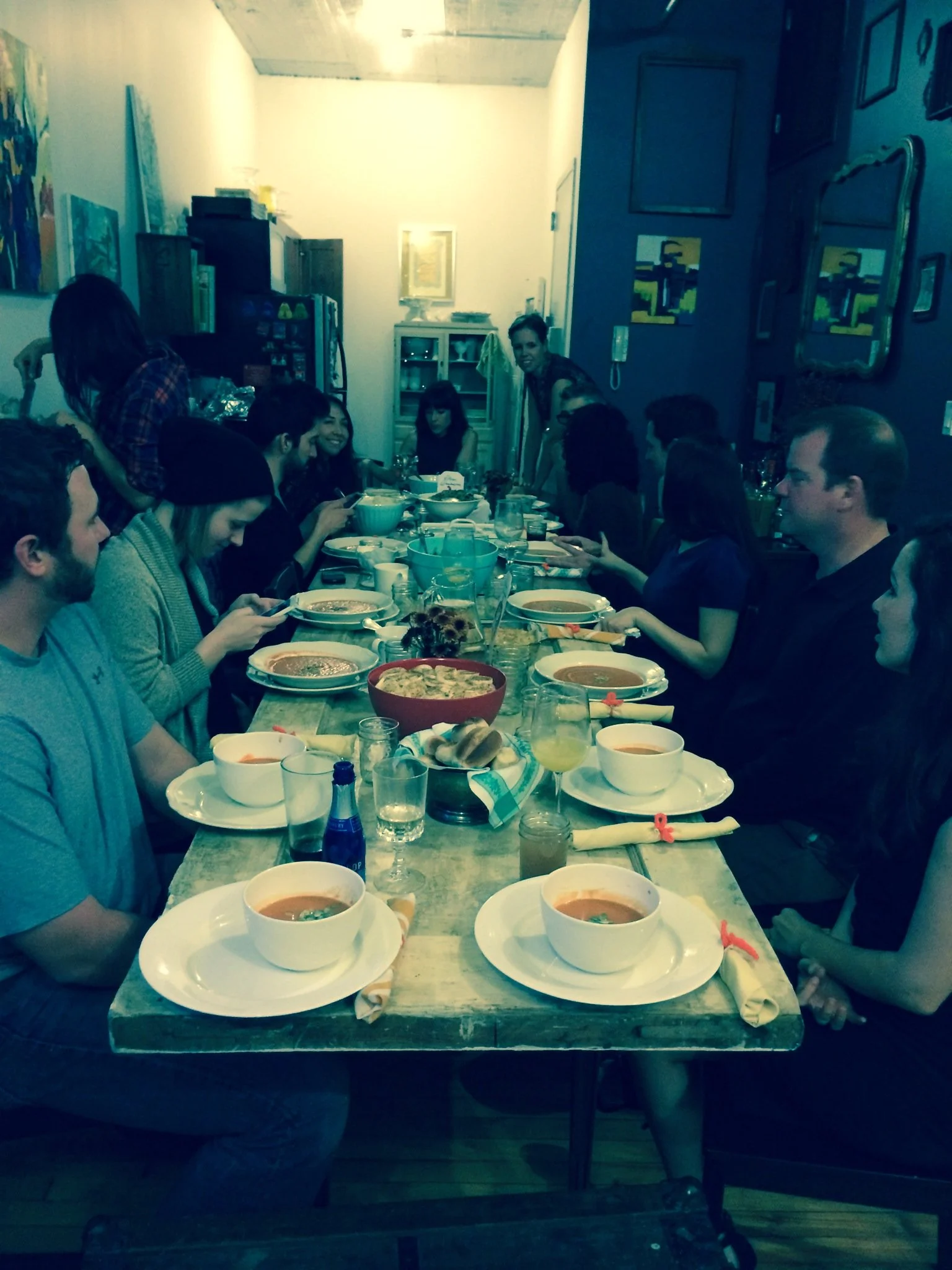Imperfect Gatherings
Creating New Traditions:
In my late 20s, I decided to start hosting Thanksgiving in my NYC apartment. At first, it was an experiment, hosting a few close friends in my limited space, gathering around tables that seemed much too small, often perched on mismatched chairs. But over time, this get-together transformed from a casual gathering to a valued tradition. Each year, friends would bring other friends, and we would fill up my loft apartment in Bushwick (back when lofts in Bushwick were affordable but lacked certificates of occupancies), laughing, sharing stories, and making toasts. There was something about these gatherings that felt important, especially to those of us who shouldn’t or couldn’t be with our families of origin for any number of reasons.
Of course, these dinners were far from perfect. There was always a bit of chaos, a burnt turkey (or maybe a few, I’m a vegetarian, not my strong suit); my cat knocking over a pumpkin pie and eating it (he was fine), and so many dishes. These mishaps turned into the memories we’d recount every year including the new people in on the jokes.
Thanksgiving 2010? An old door as a table extender.
No matter the size of the group, we’d go around and share something we were thankful for. Even when the guestlist reached upwards of 20, we would carefully go to each person and listen while we watched our food get cold. These moments, while not exactly original, were heartfelt and sincere. Somehow, that gratitude almost always boiled down to being part of something, feeling included, and simply having a place to be. I survived. I am here right now. We are together.
Thanksgiving became less about the idealized vision and more about what we created together. Our gatherings allowed us to reimagine what a holiday could mean, filling it with pieces of our own values, our cultures, and our personalities. They allowed me to discover what mattered to me about gathering, tradition, community, and family. My guests also were able to share parts of themselves and their culture as we wove together a new ritual. Looking back I can see all of the little repairs, and lasting connections that brought comfort at a time when we are often inundated with images of “ideal families”. It became clear that traditions don't have to be inherited; they can be created, from scratch, around an old farm table in Bushwick.
Axle holding down the fort before guests arrive in 2018.
There is no "right" way to celebrate. Maybe you'll gather with family or spend it solo at a meditation retreat, taking a break from the everyday stresses. You could consider volunteering, which I did many times before I began hosting myself. There are countless organizations across the city that welcome help on Thanksgiving, offering a meaningful way to spend the day. Or, maybe you'll take part in a Turkey Trot for some light-hearted exercise or even try your hand at hosting.
However you celebrate—whether with family, friends, or solo—may you find gratitude in the present moment, surrounded by those who choose to share it with you.
Careless or Care·Less?
Our culture is productivity obsessed and often the idea of slowing down and doing less can feel inaccessible or even irresponsible. Simultaneously, experts across all fields advise us that slowing down is good for our health and leads to a deeper sense of happiness and fulfillment.
British pediatrician and psychoanalyst D.W. Winnicott coined the term “good enough mother” in his 1953 book Playing and Reality. His theory posits that a “good enough” caregiver provides a sufficiently nurturing environment for a child’s psychological development, without being perfect. Within the “good enough mother” framework, the caregiver uses attunement to strike a balance between meeting the child’s needs for physical and emotional safety while also allowing for safe testing of boundaries and slight frustration for the child.
Many of us in the therapeutic space work on “re-parenting” with our clients - essentially helping clients develop the ability to offer themselves the nurturing care and understanding that they needed as children. Can part of this kindness and self-compassion focus on allowing ourselves to be “good enough” in our own endeavors? Can we, using mindful reflection, make choices about where we want to invest our time and energy and in doing so slow down and do less? Can we still care but care just a little less?
Doing less doesn’t mean that we are lazy. Or that we lack ambition. It means that we are able to set realistic expectations for ourselves (and others) and move forward with intention, acknowledging that relaxation is essential for our overall wellness. Winnicott's work highlights the importance of a nurturing environment for a child's development, which includes periods of calm and rest. By being our own good enough caregivers and allowing ourselves the same access to rest, we create a nurturing environment for our own growth and happiness.
Winnicott also emphasizes the importance of presence and attunement. A good enough caregiver is attuned to the child’s needs, providing comfort and security. By doing less and focusing on the present moment we can also become more attuned to our own needs. This presence fosters deeper connections with loved ones and a greater sense of fulfillment.
When our busyness is persistent, our minds are cluttered. We approach tasks on autopilot without the mental space necessary to generate new ideas or understand different perspectives. Rest allows the mind to wander and engage in reflection, which can increase creativity and assist in problem-solving. Winnicott believed that play and creativity were vital for a child’s healthy development. As adults, we also benefit from the freedom and space to play, explore, and create.
Winnicott's idea of the "good enough mother" reinforces what we already know - that perfection is antithetical to our well-being. Rest is essential for our mental and emotional health, fostering creativity and deeper connections. Can we take stock and not only do a little less but care a little less about doing it all to enhance balance and create a nurturing environment for our own growth?





